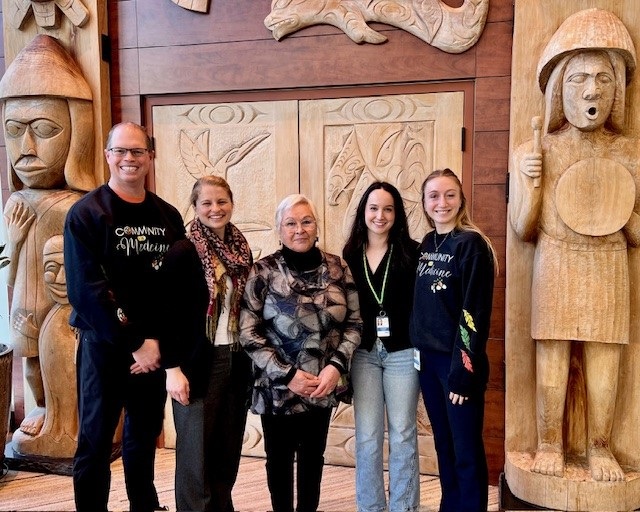Island Health's Pharmacy Learning About Indigenous Traditional (PLANT) Medicines project has been honoured with the Health Employer’s Association of BC (HEABC) Award of Merit in Leading Practices: Diversity, Equity and Inclusion.
Dr. Sean Spina, a proud Métis pharmacist and regional manager of Clinical Pharmacy Services at Island Health, supported the project’s development and mentorship as part of the health authority’s commitment to advancing culturally safe pharmacy practice. The goal was to close a critical gap in pharmacy practice: the lack of education and guidance around Indigenous traditional medicines across Canada.
"This recognition from HEABC affirms our commitment to reconciliation and culturally safe care," said Dr. Spina. "What makes this project truly special is how three distinct areas, Island Health Pharmacy Services, an Indigenous Knowledge Keeper and Island Health Research came together to create something meaningful. We've established a framework that has the potential to affect how care is delivered not just on Vancouver Island, but across the entire country."
The project was led by pharmacy resident Dr. Olivia Burton during her residency year at Island Health, under the supervision of Dr. Spina and in close partnership with Elder Barb Whyte (Billy), a respected member of the K'ómoks Nation and descendant of the Pentlatch First Nation with over 48 years of health-care experience. Elder Barb was vital to the project and is the driving force behind the All-Nations Healing Room and traditional medicine garden at Comox Valley Hospital, the first hospital-based garden of its kind in Canada.
"Plants for medicine and food for medicine are important to me because they are the foundation of health for maintaining wellness and preventing disease, and for supporting a healthy body," said Elder Barb. "Understanding how we metabolize plants and foods as medicine helps support patients when they are also taking scientific medications, by recognizing potential contraindications. Traditional Indigenous plant-based foods and medicines have been used safely by generations of Indigenous peoples and have minimal costs. These teachings remind us that health starts with balance, respect and our relationship with the land."
The Island Health region is home to 50 First Nations communities, six Métis chartered communities and many urban and away-from-home Indigenous peoples. Despite this rich cultural landscape, pharmacy professionals have historically lacked the tools and confidence to provide culturally appropriate care related to traditional medicines.
Understanding cultural differences was key to the project's success. "When you ask an Indigenous person what traditional medicines they're taking, they may not always think of the tea they drink or the food that they eat as traditional medicine. They just know that their mom or grandma has always told them to have this when they aren't feeling well," explained Dr. Spina.
In addition to Elder Barb and Dr. Spina, the team included Indigenous pharmacist Terin Lovesar, along with pharmacy resident, Dr. Olivia Burton, and Island Health research staff Heather Strosher and Tara McMillan. Together, they created educational workshops and reference materials focused on four commonly used Vancouver Island plant medicines: stinging nettle, dandelion, seaweed and plantain.

Island Health's Research Ethics Board played an important role in ensuring the project respectfully worked with sacred Indigenous knowledge, showing Island Health's commitment to ethical research practices that honour Indigenous ways of knowing.
The PLANT Medicines project supports recommendations from the 2020 In Plain Sight Report, which found that lack of recognition and respect for cultural practices, including health-care workers not being open to hearing about traditional medicines, is a common form of discrimination in health-care settings. This initiative aligns with Island Health's strategic priority of promoting cultural safety and person-centered care for Indigenous patients. The project has received funding from the BC SUPPORT Unit and is also endorsed by the Indigenous Pharmacy Professionals of Canada as it addresses educational gaps for pharmacy professionals across Canada and will foster a more informed and culturally competent workforce.
